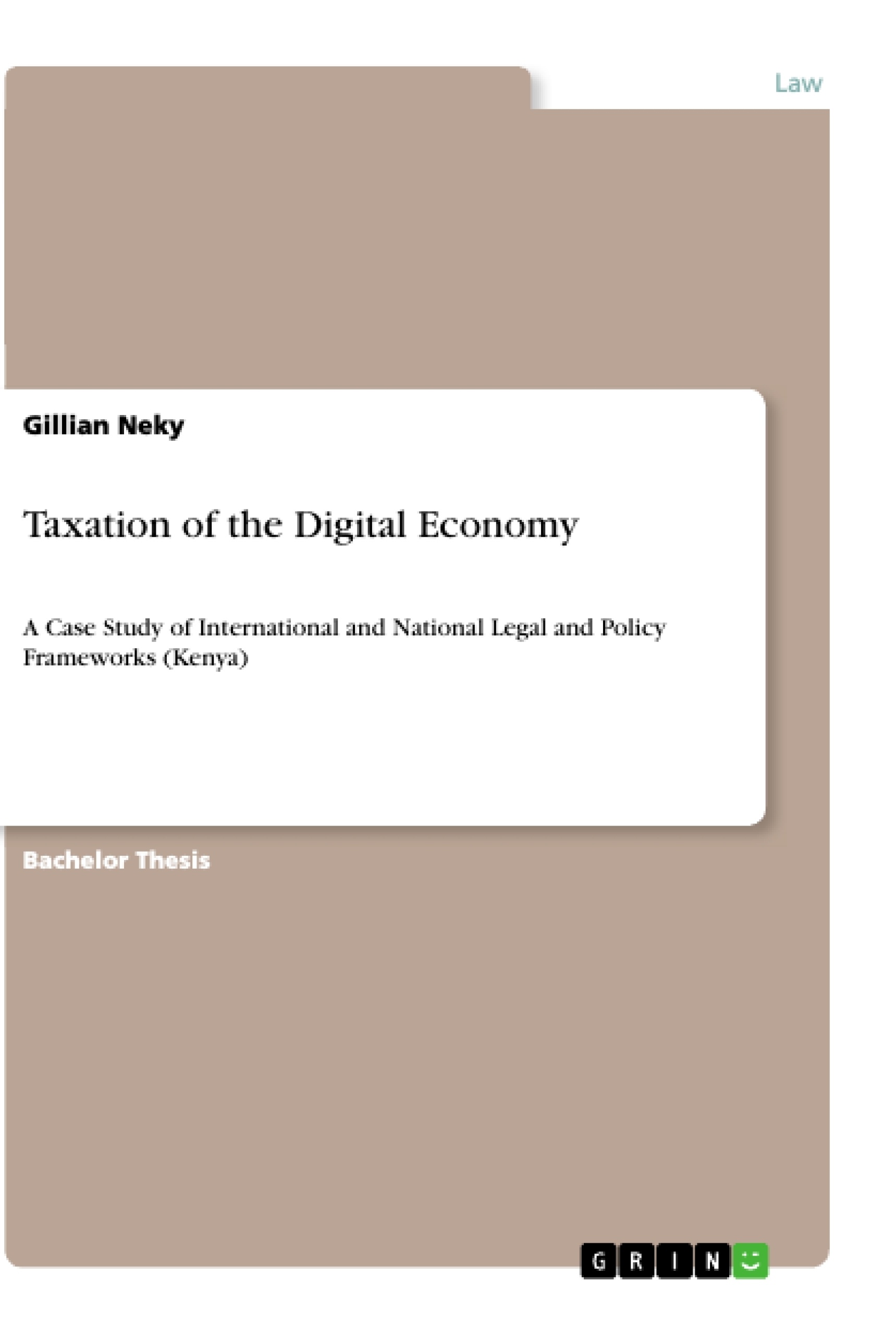This dissertation explores the concept of the digital economy, its rapid growth, and the tax challenges it has introduced, both locally and internationally. It examines the general characteristic of a sovereign state and its inherent right to tax source on income generated within its jurisdiction. The dissertation attempts to investigate the taxability of the digital economy where business is conducted without the requirement of a physical presence, a pre-requisite for tax administration. How can states and especially Kenya detect permanent establishment, for purposes of tax administration, for an economy that is heavily reliant on intangible assets and a business model based on data, network effects, and user-generated content. It therefore, focuses and looks at the scope of Kenya’s legislative and policy frameworks and its effectiveness in taxing the digital economy.
Digital businesses and especially multinational digital enterprises have been able to take advantage of the tax laws and policies that were written for an industrial age and are ill suited for today’s digital economy. The Action Plan on Base Erosion and Profit Shifting, by the Organization for Economic Co- operation and Development set out to answer the fundamental issues of BEPS (aggressive tax avoidance planning strategies), but it in itself fell short of expectations as it was not able to recommend practical, implementable solutions that would close the gaps that exist in the digital economy tax administration. The findings revealed that BEPS is not a single problem faced by all states but states face different BEPS problems and evaluate them from their own state-centred perspectives. Hence, the development of many interim measures by different states to tax the digital economy as the international community is still trying to come to a consensus on the possible, practical solutions.
The current Kenyan tax framework on taxation of the digital economy is obscure as only recent Bills tabled in Parliament try and address the issue in depth. In light of the findings of this research, it was established that the problem is not so heavy on laws and regulation on taxation of goods sold electronically, but rather, implementation of the applicable laws where they exist. The paper finally recommends possible amendments to the Kenyan legal framework and the proposed amendments are assessed by means of comparison with what has taken place in other jurisdictions.
Inhaltsverzeichnis (Table of Contents)
- Introduction
- The Digital Economy
- Definition of the Digital Economy
- Characteristics of the Digital Economy
- Taxation Challenges in the Digital Economy
- Taxation Principles
- The Concept of Permanent Establishment
- International Tax Law Framework
- Taxation in the Context of Intangible Assets
- The Kenya Tax Framework
- Taxation of Digital Goods and Services
- Taxation of Digital Advertising and Data
- Taxation of E-Commerce Platforms
- Current Taxation Policies in Kenya
- Case Study: Kenya's Legislative and Policy Frameworks
- The Value Added Tax Act (2014)
- The Income Tax Act (2013)
- The Excise Duty Act (2015)
- The Kenya Revenue Authority (KRA) Regulations
- The Finance Act (2018)
- The Finance Act (2019)
- Analysis and Findings
- The Effectiveness of Kenya's Tax Framework
- Challenges in Taxing the Digital Economy
- Recommendations for Policy Improvement
- Conclusion
Zielsetzung und Themenschwerpunkte (Objectives and Key Themes)
This dissertation aims to investigate the taxation of the digital economy in Kenya, focusing on the challenges and opportunities presented by the rapid growth of digital businesses and the evolving nature of international tax law. It seeks to analyze Kenya's legislative and policy frameworks and assess their effectiveness in taxing the digital economy.
- The definition and characteristics of the digital economy
- The challenges of taxing the digital economy, particularly in relation to the concept of permanent establishment and the taxation of intangible assets
- The adequacy of Kenya's current legal and policy framework for taxing the digital economy
- Recommendations for improving Kenya's tax framework to ensure that the digital economy is fairly and effectively taxed
- The comparison of Kenya's tax framework with those of other jurisdictions
Zusammenfassung der Kapitel (Chapter Summaries)
The dissertation begins with an overview of the digital economy, defining its key features and discussing the tax challenges it presents. The concept of permanent establishment and its application in the context of intangible assets are explored, as well as the international tax law framework, highlighting key principles such as source taxation and the international consensus on Base Erosion and Profit Shifting (BEPS). The dissertation then focuses on Kenya's tax framework, analyzing specific legislation and policies, and examining their effectiveness in addressing the challenges posed by the digital economy. Finally, the dissertation offers recommendations for improving Kenya's tax framework and discusses the potential impact of these recommendations on the digital economy in Kenya.
Schlüsselwörter (Keywords)
Digital economy, taxation, permanent establishment, intangible assets, Base Erosion and Profit Shifting (BEPS), Kenya tax framework, Value Added Tax (VAT), Income Tax, Excise Duty, Kenya Revenue Authority (KRA), digital goods and services, digital advertising, data, e-commerce platforms, legislative and policy frameworks, tax administration, international tax law.
- Arbeit zitieren
- Gillian Neky (Autor:in), 2019, Taxation of the Digital Economy, München, GRIN Verlag, https://www.grin.com/document/514933



